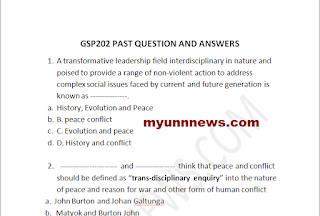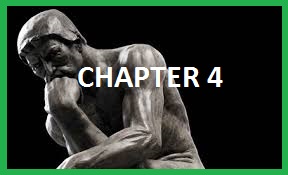GSP 207: Logic, Philosophy and Human Existence QUIZ
HUMANITIES UNIT SCHOOL OF GENERAL STUDIES
UNIVERSITY OF NIGERIA NSUKKA
First Semester Examinations, 2013/2014 Session Friday, April 2, 2014: Time 11/2 hrs.
GSP 207: Logic, Philosophy and Human Existence
Candidate’s Personal Data:
Name …………………………………………………………………………………………………………………………………………………….
Reg. No: …………………………………………………………………………………………………………………………………………………
Department …………………………………………………………………………………………………………………………………………….
Candidate’s Signature ……………………………………………………………………………………………………………………………..
Candidate’s GSP 207 Lecturer/Seminar Leader ………………………………………………………………………………………..
General Instructions: Candidates Must:
(i) Fill in the above information under Candidate’s Personal Data and complete the corresponding columns in the examination answer booklet before answering any Question
(ii) Insert this question paper inside the answer script and hand in to the invigilator at the end of the examination.
(Section A) Answer Question 1 and any other Question
1. State the Authors, year of publications and ISBN numbers of TWO of the SET texts you read, and summarized the themes with emphasis on how the Nation can attain stability and meaningful development.
2. How can Humanities be adapted to serve the needs of Africa?
3. Human Rights and Social Justice is an imperative for nation building: discuss this statement with reference to Nigerian situation.
4. Highlight the traditional Values and mention how they could resolve the crises of moral values in our time.
(SECTION B) Attempt all Questions
Supply the correct answer to each of the statements from the list of options provided.
1. The branch of philosophy that deals with studies of human knowledge is known as ----------------- A Epidemiology B. Rationalism C Epistemology D. Axiology
2. Who among these is not a rationalist? A. Plato B. Rene Descartes C. Leibniz D. John Locke
3. All these are empiricists excepts: A. Spinoza B. Huma C. Hobbes D. Berkeley
4. It was --------------------- who reconciled both rationalism and empiricism. A. Emmanuel Kant B Immanuel Kant C. Immanuel Cant D Immanuel Kant.
5. The source of knowledge that deals with the act of communicating divine truth is ----------------- A. Intuition B. Revelation C. Authority D. Reason
6. The major thrust of skepticism is ------------------ A Praise singing B. Epistemology C. Doubt D. Pragmatism
7. ----------------------------- saw skepticism as a contradiction. A St. Augustine B. St. Anselem C. St. Andrew, D. St. Francis
8. “My brother, who leads the most powerful secret cult on the campus, seeks to know if my name if still in your list of noise-makers”. In Fallacy, this statement is an example of my name is still in your list of noise-makers”. in fallacy, this statement is an example of
A. Argumentum ad Hominen B. Argumentum ad Misericordiam C. Argumentum ad Baculum D. Argumentum ad Verecundiam.
9. The following are examples of fallacies of ambiguity, except
A. Accent B. Descent. C. Amphiboly D. Equivocation.
10. The fallacy of Begging the Question is also known as:
A Questio Disputata B. Tu Quogue C. Non Causa Pro Causa D. Petitio Principi
11. Ignoratio Elenchi is another name for the fallacy of:
A. Irrelevant conclusion B. Ignorance C. False cause D. False Belief
12. United Nation Declaration of Human Rights took place in the year.
A 1939 B. 1945 C. 1948 D. 1949
13. In the 1999 Constitution of Nigeria, Human Rights were enshrined as fundamental Rights in Chapter.
A One B. Two C. Three D. Four
14. One of the following is not an aspect of Human Rights:
A. Rights to Life B. Rights to Fair hearing C. Rights to Self-determination D. Rights to Kleptomania
15. ----------------------- distinguished two sources of the expression to value
A. Plato B. John Dewey C. Phaedo D. Noetis A
16. Franz Fanen’s writings are known to advocate violence of a particular nature:
A. Physical B. Economic C. Cultural D. African E. Natural
Stay on:
www.munnnews.com for more past questions
17. Two Branches of metaphysics are:
A. Cosmogony and Ontology B. Cosmology and Ontology C. Epistemology and Axiology D. Ethics and Aesthetics
18. One of these is not among the four causes postulated by Aristotle:
A. The material cause B. The formal cause C. The final cause D. The efficiency cause
19. The equalization Scheme exalted -----------------------
A. African – Americans B. African outcast C. African dibias D. African magic E. None of the above.
20. The oracle Delphi declared: “If Croesus (the King of Lydia) goes to war with cyrus (the king of Persia), he will destroy a mighty kingdom”. This is an example of the fallacy of ------------------
A. Equivocation B. Amphiboly C. Accent D. Complex Question
>> ALSO READ POSSIBLE QUESTIONS FROM CHAPTER 6 OF THE BOOK -
CLICK HERE.
















